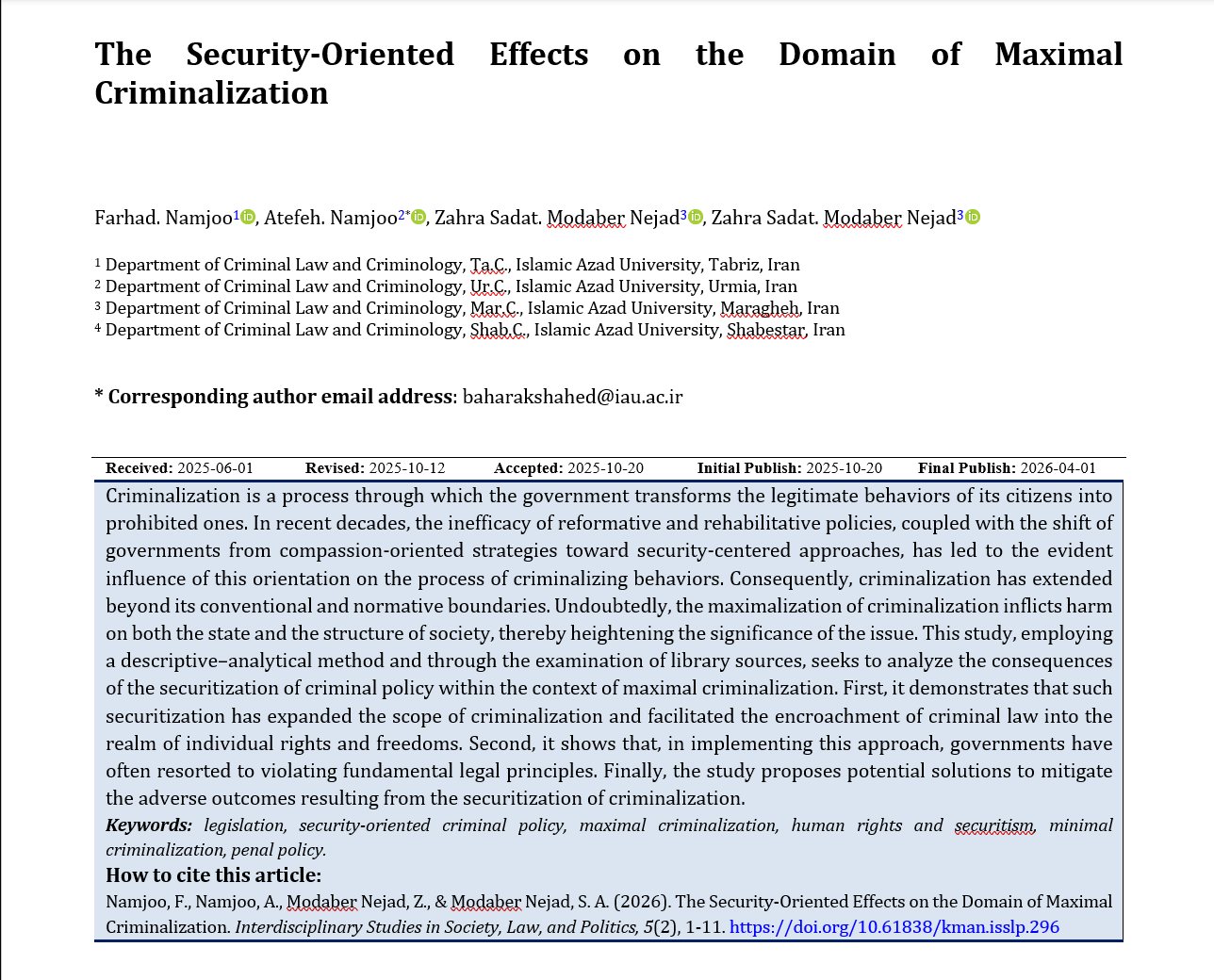The Security-Oriented Effects on the Domain of Maximal Criminalization
Keywords:
legislation, security-oriented criminal policy, maximal criminalization, human rights and securitism, minimal criminalization, penal policyAbstract
Criminalization is a process through which the government transforms the legitimate behaviors of its citizens into prohibited ones. In recent decades, the inefficacy of reformative and rehabilitative policies, coupled with the shift of governments from compassion-oriented strategies toward security-centered approaches, has led to the evident influence of this orientation on the process of criminalizing behaviors. Consequently, criminalization has extended beyond its conventional and normative boundaries. Undoubtedly, the maximalization of criminalization inflicts harm on both the state and the structure of society, thereby heightening the significance of the issue. This study, employing a descriptive–analytical method and through the examination of library sources, seeks to analyze the consequences of the securitization of criminal policy within the context of maximal criminalization. First, it demonstrates that such securitization has expanded the scope of criminalization and facilitated the encroachment of criminal law into the realm of individual rights and freedoms. Second, it shows that, in implementing this approach, governments have often resorted to violating fundamental legal principles. Finally, the study proposes potential solutions to mitigate the adverse outcomes resulting from the securitization of criminalization.
Downloads
References
Arabian, A., & Akhtari, S. (2024). A Comparative Study of Maximalist Criminalization in Iran and the U.S. Interdisciplinary Fiqh Studies Quarterly(16), 143-162.
Ardestani Boranji, M. (2010). A Study of the Effects of Securitization on the Laws of Iran and the U.S. Journal of Law Enforcement Order and Security Research(11), 31-64.
Bakhshizadeh, T. (2023). The Principle of Minimum Criminal Law in Iranian Criminal Law: Challenges and Solutions. Scientific Quarterly of Fiqh and Criminal Law Teachings, 2(3), 19-42.
Bashiriyeh, T. (2022). The Penetration of Punitivism into the Criminal Domain and Its Impact on Decriminalization Policies. Journal of Criminal Law and Criminology Research, 10(20), 7-34.
Buzan, B., Wæver, O., & Wilde, J. d. (2023). A New Framework for Security Analysis (Translated by A. Tayyeb. 2nd ed.). Strategic Studies Research Institute.
Ghaderi Namin, M. (2021). The Principle of Separation of Powers and Existing Theories on It. Scientific Monthly of Iranian Political Sociology, 5(11), 2141-2155.
Ghannad, F., & Akbari, M. (2016). The Securitization of Criminal Policy. Criminal Law Research Journal, 5(18), 39-67.
Hashemi, S. H. (2020). The Consequences of the Securitization of Criminology on Criminal Law and Its Conflict with Human Rights Issues. Scientific-Promotional Quarterly of Religion and Law(2), 163-187.
Kalantari, S. N. (2022). A Comparative Study of Security-Oriented Criminalization in Crimes Against National Security (Case Study: Iranian and French Criminal Law). Scientific Monthly of Iranian Political Sociology, 5(12), 561-572.
Khosrowshahi, G., & Ganji, A. (2018). Investigating Expediency-Oriented Criminalization in the Legal System of the Islamic Republic of Iran. Criminal Law Research Journal, 8(28), 175-206.
Mahdavi Pour, A., & Shahrani Karani, N. (2014). Securitization of Criminology: Strategies and Its Effects on Criminal Law. Criminal Law Research Journal, 5(1), 159-188.
Majidi, S. M. (2009). Manifestations of the Emergence of Security-Oriented Criminal Law in France. Law Quarterly, 39(2), 327-344.
Majidi, S. M. (2017). Strategies for Ensuring Development-Oriented Criminalization in Criminal Law. Criminal Law Research Journal, 6(1), 259-278.
Majidi, S. M., & Taj Abadi, F. (2019). Security-Oriented Criminalization Techniques in Iranian Criminal Law. Journal of Islamic Jurisprudence and Law Studies, 11(21), 289-316.
Mandaei, E., & Ashouri, M. (2015). Justifications, Criteria, and Forms of State Intervention in Criminal Policy. Journal of Law and Politics(24), 97-120.
Mandaei, E., & Ashouri, M. (2019). An Analysis of Security-Oriented Criminal Policy in Light of Ethical Principles and Human Rights Standards. Journal of Ethical Research, 9(1), 183-191.
Mohammadnejad, H., & Tajik, R. (2018). Causes of Maximalist Criminalization and the Imperatives for Its Structural Transformation in Iran. Quarterly Journal of Private and Criminal Law Research(38), 141-163.
Shams Nateghi, M. E., & Jahed, M. A. (2008). Causes and Consequences of Criminal Inflation and Strategies for Countering It. Journal of Fiqh and Law, 5(17), 93-120.

Downloads
Additional Files
Published
Submitted
Revised
Accepted
Issue
Section
License
Copyright (c) 2025 Seyedeh Monira Hejazi, Baharak Shahed, Jamal Beigi, Keyvan Heydarnejad (Author)

This work is licensed under a Creative Commons Attribution-NonCommercial 4.0 International License.





